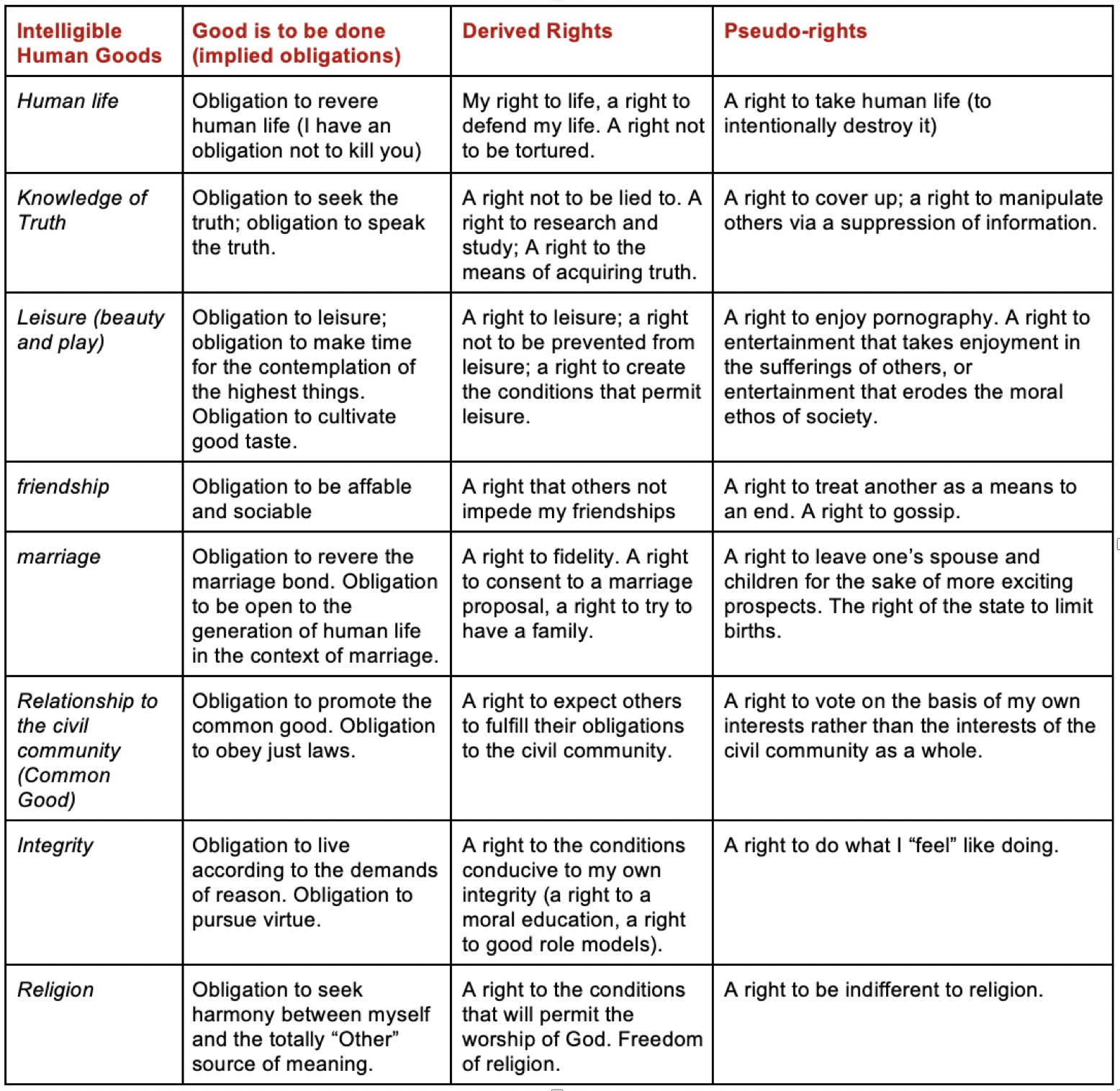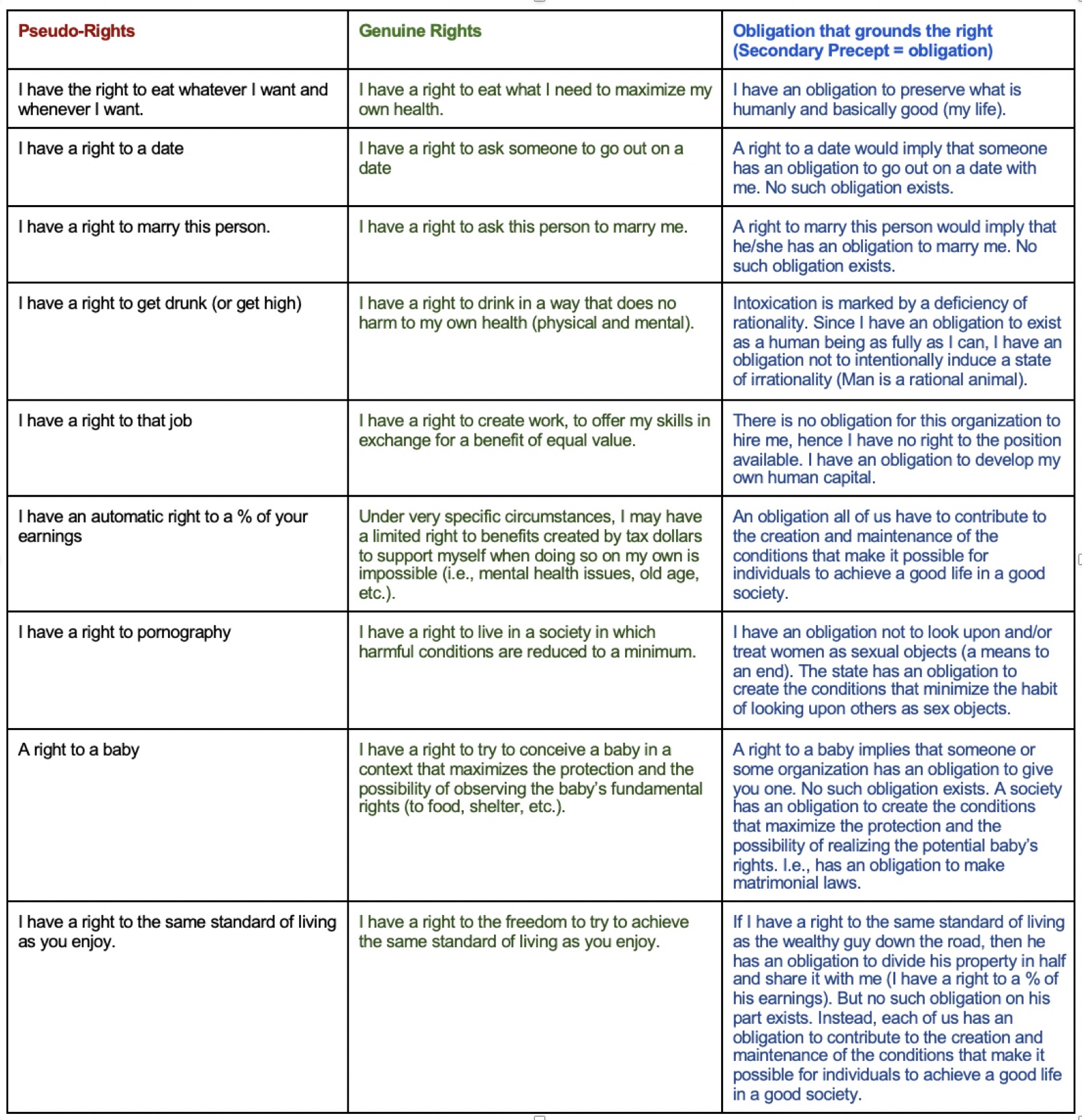Natural Law for Catholic Educators. Part III
Rights, Pseudo Rights, and Obligations
Rights and Obligations
Within the past 40 years, there has been a great deal of "rights talk", much of it very loose and undefined. I once asked a class of students of mine whether I have a right to lie to them. I was astounded to see that all of them, without exception, agreed that I have that right. I asked them to explain to me precisely how that can be the case. Of course, they were unable; moreover, they were unable to tell me what a right is, how we acquire them, their origins, their possible limits, etc. In the end, I had to simply come out and assert in no uncertain terms that no, I do not have the right to lie to them. The reason is that they have a right to the truth. Again, however, we found ourselves at an impasse: for how do I know we have a right to the truth? And what does it mean to have a right in the first place? What is the origin of that right as well as the origin of all our rights?
Basically, rights are not first moral principles. A right is nothing other than a corresponding obligation. For example, your right to life is nothing other than my obligation not to kill you. If I did not have that obligation, you would not have a right to live. And your right to be told the truth is nothing other than my obligation not to lie to you. And so, it is obligations, not rights, that are first principles; rights are derived from obligations which in turn are grounded in the precepts of natural law. In fact, the precepts of natural law are really just basic modes of responsibility. My obligation not to kill you is derived from the precept that I ought not to willingly destroy a basic intelligible human good, namely your life, for the sake of some other human good, i.e., my own life. And my obligation not to lie to you is derived from my obligation to reverence my own integrity, not to mention the precept to treat you in a way that respects your status as equal in dignity to me (I resent it when I am lied to, for I feel I have been manipulated, therefore I ought not to lie to you).
This angle makes it much easier to test peoples' various claims to certain rights. If they cannot be derived in any way from fundamental modes of responsibility, then it is likely that these claims are alleged rights that are ultimately vacuous. The following is a table that attempts to illustrate the origin of genuine rights. It also includes a column of pseudo-rights having no origin in the basic principles and precepts of natural law.
Natural Rights, Pseudo-Rights, and Obligations
.

.
Alleged or Pseudo-Rights versus Genuine Rights
.

.
Concluding Thoughts
For the Canadian Charter of Rights and Freedoms to make no mention of obligations is to imply that the civil community as a whole has no right to expect anything from you and me. In other words, rights are a purely individual matter. But there are all sorts of behaviors that the civil community has a right to expect from you and me. Hence, you and I have some fundamental obligations towards the common good (the good of the civil community as a whole). For example, we have a duty to develop our own human capital (marketable skills, knowledge, and experience), an obligation not to waste tax dollars by skipping school, a duty to contribute to the common good of the civil community, a duty to obey laws that protect the common good, a duty not to harm society (i.e., not to engage in treason) etc. A charter of rights alone, without any mention of duties, obligations, or responsibilities, can do a great deal to nurture a generation of citizens with a deeply entrenched sense of entitlement and a deficient sense of personal responsibility .
Finally, a Charter so vague in detail and precision stands in need of it; but who will provide that precision and content? That vacuum will likely be filled in by unelected judges; but in a democracy, that is the task of the people. The danger is that some judges may be activists operating out of a philosophical framework that is at odds with the majority of the people. A charter of vague rights without definite obligations allows any judge to interpret a proposed law in a way that conflicts with his own interpretation of that charter. The result is a constitution created by an oligarchy. The problem with this is that knowledge is widely dispersed among the people, not concentrated in the small circle of a select few (i.e., a few unelected judges).
Article copyrights are held solely by author.
[ Japan-Lifeissues.net ] [ OMI Japan/Korea ]